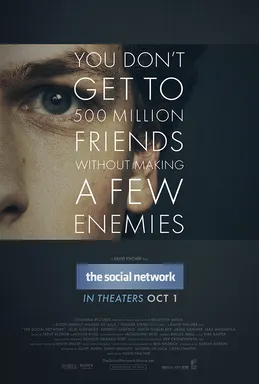Historical accuracy of The Social Network

Historical accuracy of The Social Network

Characters
Mark Zuckerberg
Based on the real Facebook founder. However, Zuckerberg and others have disputed the film's portrayal of his personality and motivations (e.g., being driven by social rejection), arguing significant inaccuracies.
Eduardo Saverin
Based on the real co-founder. The film draws heavily from the book The Accidental Billionaires, which used Saverin as a primary source; the portrayal reflects his perspective on the founding and his conflict with Zuckerberg.
Sean Parker
Based on the real Sean Parker. The film depicts his influential role in Facebook's early growth and his disruptive influence, though Parker has disputed aspects of the characterization as overly villainous/simplified.
Cameron Winklevoss
Based on the real Cameron Winklevoss. The film accurately depicts his and his brother's claim that Zuckerberg stole their idea for ConnectU (HarvardConnection) and their subsequent lawsuit.
Tyler Winklevoss
Based on the real Tyler Winklevoss. The film accurately depicts his and his brother's claim that Zuckerberg stole their idea for ConnectU (HarvardConnection) and their subsequent lawsuit.
Divya Narendra
Divya Narendra was the real third partner involved with the Winklevoss twins in the HarvardConnection/ConnectU project. His role alongside them in approaching Zuckerberg and later suing is accurate.
More characters
Erica Albright
Erica Albright is a fictional character created for the film's opening scene. While perhaps inspired by past relationships, she does not represent a specific real person from Zuckerberg's life.
Christy Lee
Christy Lee appears to be a fictional character, possibly a composite, representing Eduardo Saverin's social life and relationships during the period.
Marilyn Delpy
Marilyn Delpy is a fictional character representing the legal team involved in the deposition scenes.
Dustin Moskovitz
Moskovitz was a real co-founder of Facebook and roommate of Zuckerberg. He is depicted accurately in his minor role as part of the early founding team.
Chris Hughes
Hughes was a real co-founder of Facebook. Like Moskovitz, he is depicted accurately in his minor role within the early stages of the company's founding.
Larry Summers
Larry Summers was the real President of Harvard at the time. His dismissive meeting with the Winklevoss twins regarding their complaint against Zuckerberg is based on accounts of the actual event.
Story
Mark Zuckerberg creating Facebook
The film portrays Mark Zuckerberg as the main creator of Facebook, which is based on real events. While the film focuses on Zuckerberg, it also acknowledges the contributions of others, particularly Eduardo Saverin.
Facebook's origins at Harvard
The film depicts Facebook's origins at Harvard University in 2003, starting as a website called Facemash and evolving into the social networking platform.
The Winklevoss twins' lawsuit
The Winklevoss twins' lawsuit against Zuckerberg, claiming he stole their idea for a social network, is a major plot point and is based on a real legal dispute.
The conflict with Eduardo Saverin
The film dramatizes some aspects of their relationship and the conflict that led to Saverin's eventual ousting from the company.
Sean Parker's influence
Sean Parker's influence on Zuckerberg and Facebook's early development is depicted in the film. While Parker did play a role, the film may exaggerate his influence and his involvement in certain events.
Facebook's rapid growth
The film captures the rapid growth of Facebook from a Harvard-only website to a global social networking phenomenon. This rapid expansion is a key part of the story.
The legal battles and settlements
The film depicts the various legal battles and settlements surrounding Facebook's early years. While these are based on real events, the film simplifies the complexities of the legal proceedings.
The film's ending
The film ends with Zuckerberg reflecting on his success and sending a friend request to his ex-girlfriend. This is a fictionalized ending that serves to highlight his emotional isolation despite his achievements.
Setting
The portrayal of the tech industry
The film offers a glimpse into the culture of the tech industry, including its competitive nature and its fast-paced environment. However, some aspects may be stylized or exaggerated for dramatic effect.
